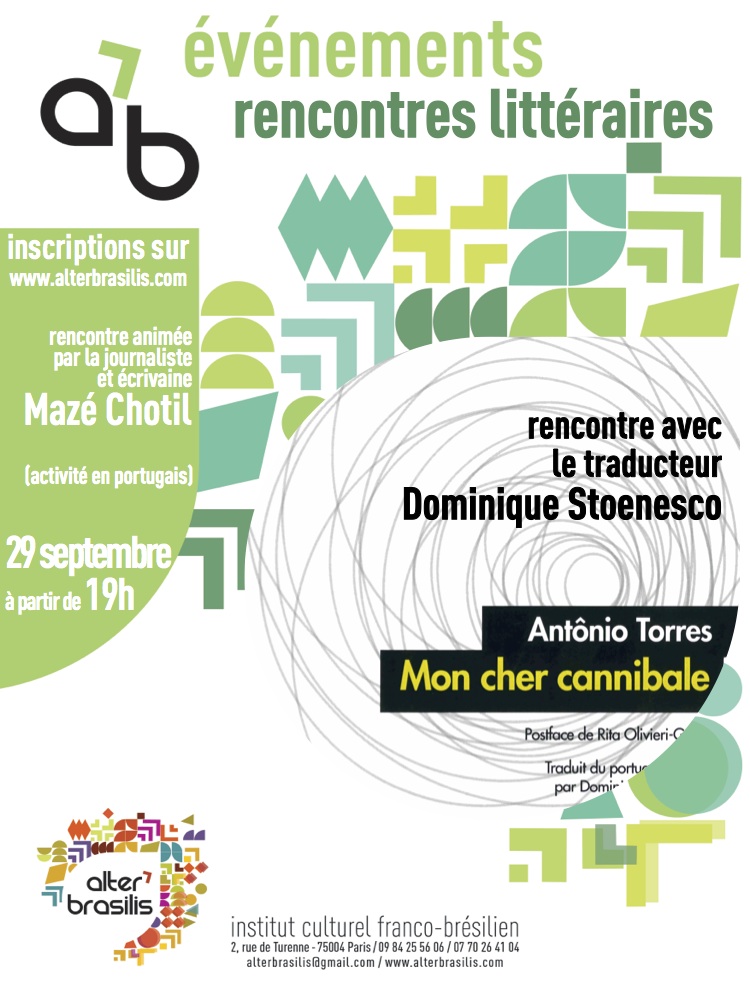You can see the original article on Wikipedia: The Land (Torres Novel)
For a PDF file, click here: The Land (Torres, Antonio) PDF
The_Land_Torres_novel-11
Site oficial do escritor Antônio Torres
You can see the original article on Wikipedia: The Land (Torres Novel)
For a PDF file, click here: The Land (Torres, Antonio) PDF
The_Land_Torres_novel-11“A novel that must be read, an intellectually demanding political, social and literary creation, a novel of psychological depth, remarkable imagery and tragic, absurd beauty. Torres’ novel is a challenge; nonetheless it offers a wonderful opportunity to learn about a people, about a culture that knows so much more about us than we know about them.”
Los Angeles Times
“Torres’ book mixes places and times, so that the narrator alternates between talking to the dead, quarreling with his wife, and dreaming of his mother. The style is musical and moralistic, spattered with tags of songs, proverbs . . . , and reminders that ‘to remember is to live’.
The New Statesman
“The flight to Rio de Janeiro and São Paulo symbolizes an important drama for Brazilians. To abandon drought, poverty, and repressive tradition for the hope that the adopted cities represent is to act a role in a contemporary play whose protagonists are a continuous stream of refugees. The deep cleft that separates the two parts of the country is much harder to cross than anyone imagines . . . Torres’ books, widely read in Brazil, reveal a compelling need to define the relationships between individuals and institutions and to understand the critical metaphorical and actual journeys they make. Brazil is a country of frontiers, its sophisticated modernity juxtaposed with vast wilderness and daunting challenges, a country truly on the cusp.”
Hungry Mind Review
“The topic of craziness was a crucial one in the 1970s, not only because of individual life experiences but also because of the repression and censorship enforced by the military dictatorship, which lead many young intellectuals into political exile or psychiatric treatment. Blues for a Lost Childhood (1986) picks up earlier themes. The protagonist’s hallucination brings up Brazil’s political past, this time from a Spanish-American perspective.”
Dictionary of Brazilian Literature
“By the time we join Calunga and his cousin in Blues for a Lost Childhood, the world has inexorably started turning. The dizziness is that of the military dictatorship and its Economic Miracle, a ‘Nobel Prize afternoon’ of ‘traffic jams, tunnels, overpasses, sirens, barracks, tortured and torturers, and the dog-shit on the sidewalks.’ The childhood language of prayer and ritual, lullabies, romantic poetry memorized at school, rural ballads reciting murder and myth, remains as both a haunting and comforting reminder of another universe, populated too by the precessions of blue ‘angels’—coffins, the tragedy of infant mortality. But it is rapidly submerging beneath a new language, that of journalism and advertising, television and popular song, state propaganda and revolutionary protest, where any perspective of depth and truth has disappeared . . . In the limbo between these two cultures, where there is no longer any centre to hold, and where there is no possible return, then perhaps suicide, alcoholism or madness are understandable options.”
Babel Guide to Fiction from Portugal, Brazil & Africa
in Translation
“Morning StarTorres develops a syncopated, stop-start style, effervescent, raked with satire and insight into ‘the outrageous things that are going on around us’ . . . Remarkable.”
Morning Star
Repercussão em diversos jornais:
Acclaim for The Land
“An almost classic account of the notoriously poor area of its author’s birth.” – London’s Financial Times
“Tears at you like an early Buñuel movie.” – The Observer
“Vivid, moving, explosive . . .” – San Francisco Examiner
“Full of the unanswered quesJons of a third world country in transiJon.” – Publishers’ Weekly
“I very much admire the irony, the warmth and style of The Land, which so brilliantly describes poor people in a village whose life is leaving it.” – Doris Lessing
“UpliPed by Torres’ melodic prose and inJmate knowledge of rural Brazil . . .” – Kirkus Reviews
“The Land is wriTen in a spare, austere, inward-looking style which mirrors the harshness of the Sertão and plunges the reader into the hopelessness, sense of loss, random violence and fragmentaJon the people suffer. . . . At a meeJng with the author in Santo André, the most industrial zone of São Paulo, one thousand naJve baianos turned up: “We feel we are the characters in your books. . . .” – Guardian
“Part of the growing awareness of the importance of LaJn American wriJng, and especially the rich cultural heritage of Brazil with its mix of African, Amerindian and European tradiJons.” – Third World Quarterly
“Nelo’s story becomes an emblem . . . of the transiJon these people must make to an inhospitable, urbanised twenJeth century where only the very old retain the centuries-long love of the land itself, now largely owned by the banks . . . An elegant, finely structured work.” – The Scotsman
“In a style cut back to the essenJals, drawing on the folklore and culture of Brazil’s impoverished ‘backlands’ and uJlizing fragments of songs, jokes, prayers, and popular tales, Torres shows us a community in which those who can leave do so, and those who remain dream of making it to the city, São Paulo, where there are ‘30 leagues of paved streets’ . . . The Land speaks in the language of exile and biTer homecoming and it repays careful reading.’” – Tribune
Clique para ver maior em uma nova aba:
Pluralisation de l’espace amérindien Mon cher Cannibale – Antônio TORRES – Rédigé par Agathe BRIAND
Dossier_BRIAND_Litterature_Bresil_M2_Les_AmeriquesClique para ver maior em uma nova aba: Antônio Torres, el escritor que surgió del Sertão – Ascensión Rivas Hernández
Antonio_Torres_el_escritor_que_surgio_del_sertao-Ascension_Rivas-1
Clique para ver maior em uma nova aba (PDF): Texte de A Torres à l agregation de portugais 2017.
Texte_Antonio_Torres_a_l_agregation_de_portugais_2017Clique para ver maior em uma nova aba (PDF): Cafe Litteraire: Mon cher cannibale d’Antonio Torres.
Cafe_litteraire_MON_CHER_CANNIBALE_8_juin_2017-2Clique para ver maior em uma nova aba: Recenzie Acest pămant de Antonio Torres.
Recenzie_Acest_pamant_Antonio_Torres